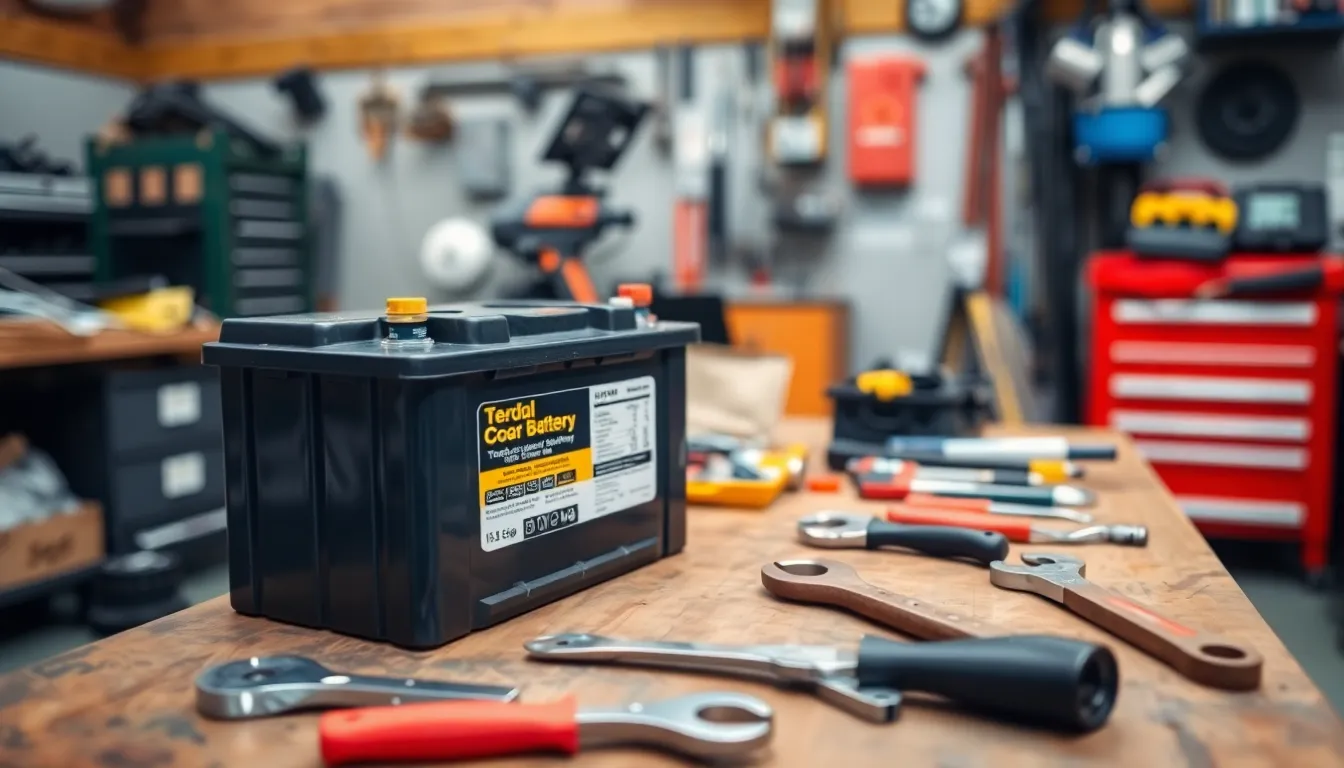When your car refuses to start and you hear that dreaded click-click-click, it’s usually a sign that your battery’s gone to the great garage in the sky. But before you panic and consider a life of public transportation, let’s talk about the cost of a new car battery. Spoiler alert: it’s not as shocking as you might think!
Table of Contents
ToggleAverage Cost of a New Car Battery
Replacing a car battery typically ranges from $50 to $250, depending on multiple factors. The overall expense may vary by brand and location.
Factors Influencing Battery Prices
Several factors impact the price of car batteries. Battery size plays a significant role, as larger batteries often cost more. Additionally, the battery’s type shapes its pricing, with advanced technology batteries being pricier. Brand reputation also contributes; well-known brands may charge extra for their reliability. Geography matters too, as local market conditions influence pricing. Installation costs can add to the total, especially at dealerships and mechanics.
Types of Car Batteries and Their Costs
Car batteries come in three main types, each with varying costs. Lead-acid batteries typically range from $50 to $120 and are common for conventional vehicles. AGM (Absorbent Glass Mat) batteries cost between $150 and $250, with enhanced performance thanks to their durability and efficiency. Lithium-ion batteries, while less common, usually exceed $300 due to their cutting-edge technology and long lifespan. Each battery type serves distinct needs, ensuring drivers find an option that suits their vehicles and preferences.
Where to Buy a New Car Battery

Finding a new car battery requires considering various purchasing options that best meet your needs. Choices include dealerships, aftermarket suppliers, and online platforms.
Dealerships vs. Aftermarket Options
Dealerships often offer batteries that match factory specifications, ensuring compatibility with specific vehicle models. Prices at dealerships typically run higher, reflecting brand trust and warranty benefits. Aftermarket options present a wider variety of brands and types, often at lower prices. Drivers can choose from reputable aftermarket retailers and local parts stores for competitive pricing. Both avenues deliver advantages, so preferences may dictate the choice between dealership and aftermarket batteries.
Online Retailers and Shipping Considerations
Online retailers excel in convenience, allowing users to compare prices easily and read customer reviews. Many platforms stock various battery brands at competitive rates. Some online stores offer free shipping, which lowers overall costs. Buyers should note shipping times, as delays may occur depending on location and stock availability. Ensuring proper installation information is available is crucial, especially when selecting a battery without a professional installation option.
Installation Costs
Installation costs for car batteries can vary based on the method chosen. Understanding these options helps drivers budget effectively.
DIY Installation vs. Professional Services
DIY installation of a car battery can save money. Many drivers choose this route for its simplicity. Installing a lead-acid or AGM battery typically requires basic tools and a few minutes. Online tutorials guide those unfamiliar with the process. Professional services, however, offer convenience and peace of mind. Mechanics usually charge between $20 to $100 for installation, depending on vehicle make and model. They ensure proper handling and disposal of old batteries. Weigh the potential savings against comfort with installation before making a decision.
Warranty and Guarantee Options
Warranty and guarantee options hold significant importance. Most new car batteries come with warranties ranging from 1 to 3 years. Lead-acid batteries typically include a 1-year warranty, while AGM batteries often offer up to 3 years. Buyers should always check details before purchasing. Some retailers even provide guarantees covering performance for specific timeframes. Understanding these terms helps protect against premature battery failures. Opting for a reputable brand with robust warranty coverage often pays off in the long run.
Tips to Save on a New Car Battery
Exploring ways to save on a new car battery can significantly lower replacement costs. Drivers often benefit from various strategies.
Discounts and Promotions
Many retailers provide discounts and promotional offers on car batteries. Seasonal sales often include holiday promotions, which may offer substantial savings. It’s prudent for consumers to check local advertisements or online platforms for additional deals. Certain auto parts stores sometimes have loyalty programs that provide members with exclusive discounts. Off-season shopping can also lead to lower prices, as demand drops in colder months when fewer people need replacements.
Recycling and Trade-in Programs
Participating in recycling and trade-in programs presents another opportunity to save. Many retailers accept old batteries for recycling and offer credit towards a new purchase in return. This credit can reduce the overall cost of a new battery significantly. Additionally, local vehicle service centers or auto parts stores might host such programs to encourage responsible disposal. Recycling efforts not only save money but also promote environmentally friendly practices within the automotive industry.
Replacing a car battery doesn’t have to break the bank. With prices ranging from $50 to over $300 depending on the type and brand, there’s an option for every budget. Whether opting for a lead-acid battery or a more advanced lithium-ion model, understanding the costs involved can help drivers make informed decisions.
Exploring various purchasing options and installation methods can further reduce expenses. By taking advantage of discounts and recycling programs, consumers can save even more while ensuring their vehicle runs smoothly. With the right knowledge and approach, tackling battery issues becomes a manageable task.




